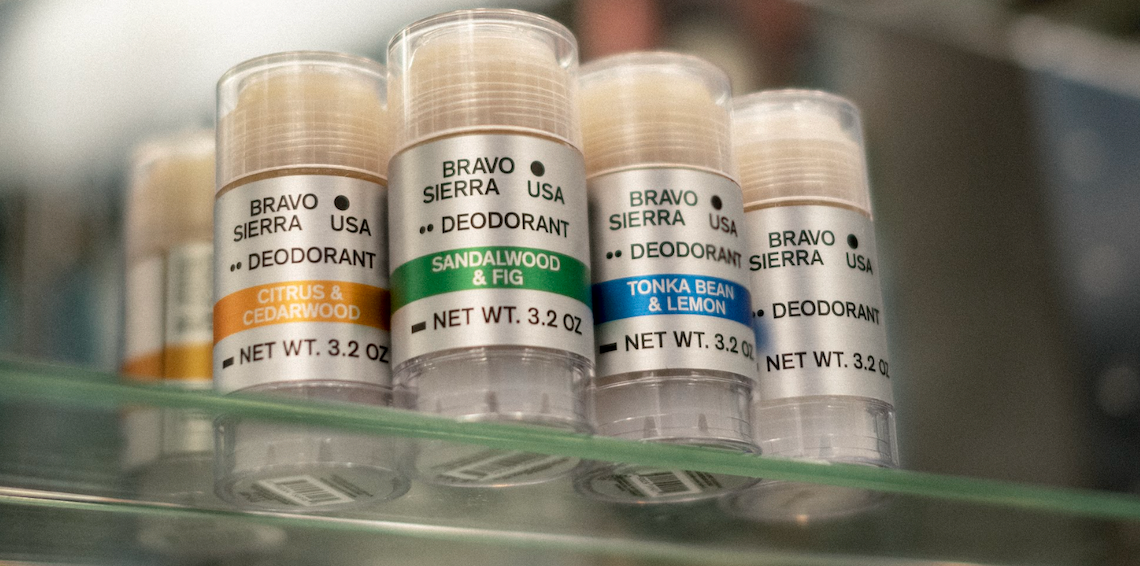Military-inspired personal care brand Bravo Sierra announced Thursday it raised $17 million in a Series B.
The fundraise was led by The Merchant Club with additional investors like Mousse Partners, Capstar Ventures, Redo Ventures and AF Ventures. Bravo Sierra previously raised approximately $18 million in outside capital. Annual revenue has doubled year-over-year since the brand launched in 2019. Bravo Sierra was founded by Justin Guilbert, co-founder of coconut water brand Harmless Harvest and snack brand GoodFish, and Benjamin Bernet, who formerly led marketing at Kiehl’s and L’Oréal Luxe.
The new funding will be directed toward growing the brand’s omnichannel strategy, including continuing retail growth within the military, mass and e-commerce channels, and investing in the company’s product innovation pipeline with domestic R&D and manufacturing. At Bravo Sierra’s launch, it was exclusively sold through Army & Air Force Exchange Service. Prior, the founders had presented it to the Department of Defense, which operates the Exchange Service, the online and brick-and-mortar retailer for U.S. Army and Air Force bases worldwide. Alongside its online channel, it operates 4,000 retail stores across the U.S and internationally. Bravo Sierra is also sold through Target, Ulta Beauty and Amazon. It will expand to Walmart via 4,500 stores on August 20.
“The priority for the next 18-24 months is to have a significant market share within Walmart, Amazon and Target,” said Bernet.
When Guilbert and Bernet set out to create a beauty brand, they wanted to create a mass brand that represented the next “great American brand,” said Guilbert.
Guilbert pointed to the brand’s alignment with the military, driven by the military’s top ranking in the Gallup Poll’s annual survey on Americans’ confidence in major U.S. institutions. In 2022, 64% of survey respondents said they have “a great deal/quite a lot” of confidence in the military, compared to 31% for organized religion or the church, 25% for the Supreme Court, and 11% for television news. Guilbert attested to the size of the potential customer market as roughly 30 million people, between active duty service members, veterans, and their spouses and children. And when accounting for people with a direct relationship to the military, that customer market grows to 200 million, he said.
“There is this incredibly aspirational community that has this granular relationship with 80% of the [entire U.S.] population and no one has figured out a way, from a beauty or a personal care standpoint, to connect those dots — to connect with that community and then leverage that for the greater population,” said Guilbert.
Ad position: web_incontent_pos1
To further develop the brand’s products and point of view, Bravo Sierra maintains an online community via Slack and Whatsapp, which it refers to as a “Battalion,” of 2,500 U.S. Special Operations Forces, including active service members and veterans. They help design, develop and test its products. Bernet said the brand takes a two-pronged approach to developing its products, which include deodorant, shaving cream and dry shampoo: The first is to focus on core personal care products like deodorant and body wash and distribute them as widely as possible. The second is to launch what he calls “margin accretive and momentum-building” products, such as the brand’s first cologne, by the end of the year. Future momentum-building products will have tighter distribution, such as DTC-only or Amazon-only, he said.
“Justin and Benjamin know what they are talking about, are confident in their approach and are not afraid to talk about the issues and challenges on top of the opportunities that Bravo Sierra has,” said Nicolas Geiger, senior advisor at Redo Ventures and president of L’Occitane Group in Japan. “The army community they developed and used to construct their product portfolio and the quality of their branding made it clear they are trying to develop something different and unique on the market.”




